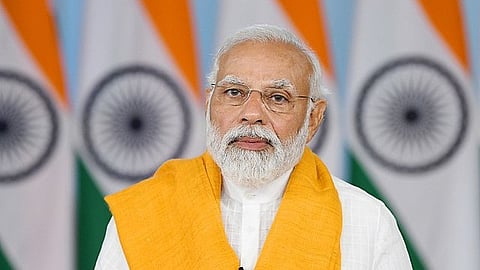
- Home
- न्यूजग्राम
- NewsGram USA
- India
- World
- Politics
- Entertainment
- Culture
- Lifestyle
- Economy
- Sports
- Sp. Coverage
- Misc.
- NewsGram Exclusive
- Jobs / Internships

On his way to Brazil to attend the ongoing BRICS summit, Prime Minister Narendra Modi has made a series of back-to-back bilateral visits to Ghana, Trinidad and Tobago, and Argentina, and will travel to Namibia on the final leg of his tour. His stop in Trinidad and Tobago has not only reinforced India’s strategic partnership with the Caribbean nation but also brought back memories of his earlier visit — particularly one that left a lasting impression on industrialist M.L. Mittal.
On the second leg of his five-nation tour, Prime Minister Narendra Modi visited Trinidad and Tobago, where he is scheduled to hold talks with President Christine Carla Kangaloo and Prime Minister Kamla Persad-Bissessar to further strengthen bilateral relations. In his speech, he reaffirmed Trinidad and Tobago's priority status in India’s foreign policy and deepened cultural diplomacy by gifting holy water from the Mahakumbh and a replica of the Ram Mandir to his counterpart.
At an event attended by members of the Indian diaspora, PM Modi celebrated their achievements and emotional ties to India. “With over 35 million people spread across the world, the Indian diaspora is our pride,” he said. “Each one of you is a Rashtradoot — an ambassador of India’s values, culture, and heritage.”
He also announced a significant gesture: Overseas Citizens of India (OCI) cards will soon be granted to sixth-generation Indian-origin citizens of Trinidad and Tobago, a move welcomed by many as a step toward reconnecting with the descendants of Girmitiyas — indentured labourers sent abroad during colonial times.
A Visit Remembered: Mittal’s Rare Glimpse into Modi’s Past
The Prime Minister's latest visit stirred nostalgia in M.L. Mittal, a businessman who first hosted Narendra Modi in Trinidad and Tobago 25 years ago, when Modi was a senior BJP leader but held no formal government position. In a candid reflection, Mittal shared how Modi’s simplicity and clarity of thought left a lasting impression that remains undiminished even today.
Mittal said he first met Narendra Modi in New York in 1998, at an international event themed around Vasudhaiva Kutumbakam — The world is one family, which is an ancient Indian ideal. Mittal recalled, “At that time, Modi ji held no government position.” He added, “Yet his maturity, clarity of thought, and global outlook left a deep impression on me. When he asked me, ‘How can you help me?’—it was a question that reflected rare humility and purpose.”
Later, during Modi’s visit to Trinidad and Tobago, Mittal hosted him at his modest apartment. The memory of that visit is still vivid in his mind.
Mittal said, “He came along with some senior karyakartas and stayed at my apartment, which had just four bedrooms.” The air-conditioned rooms were allotted to the senior leaders. Mittal said he offered him his room or even offered to arrange a hotel, but Modi ji insisted on sleeping in the utility room, which was used for ironing clothes — no AC, no attached bathroom. “He said, ‘This is perfect for me,’” Mittal recalled.
What truly stood out was Modi’s daily discipline and humility. “Every morning, he would wake up by 5 AM, make tea, and lay out breakfast for everyone before the staff even arrived. That kind of groundedness in a leader was rare,”
Mittal shared that this wasn’t an isolated instance. Years later, when he visited Modi in Delhi during his tenure as BJP’s national general secretary, he found him living in a basic staff quarter with minimal belongings. “He received me in a small room with just a small bed and a few belongings. He even fetched water himself from the tap in his bottle. Despite his rising stature,
Narendra Modi never let power or position affect his simplicity or personal discipline,” said Mittal.
Also Read: A "Young MP" from India who got embarrassed by Trump at Mar-a-Lago
Even on international trips, Modi’s simplicity remained unchanged. Modi preferred staying with swayamsevaks or party workers rather than in luxury hotels. When hungry, he would often say, ‘Jaggery and peanuts are enough for me.’
Mittal also recalled visiting Modi in Gujarat, where the then CM would arrange elaborate meals for guests but abstain himself, citing religious fasting. “He would say, ‘It’s my fasting day. I’ll just have some fruits.’ Mittal revealed that Modi received a modest daily allowance of USD 25, a portion of which he often returned to the party to be used for public benefit.
[Rh/Eth/VP]
